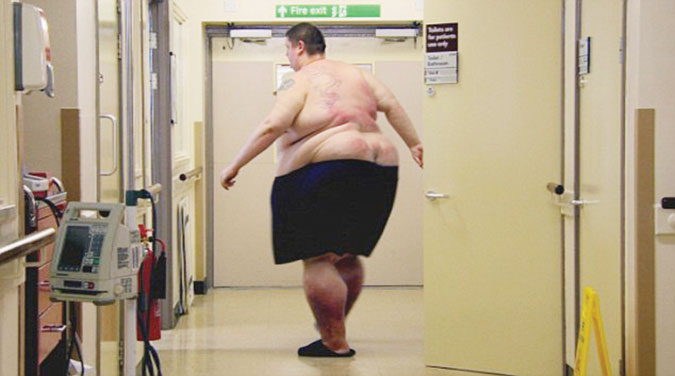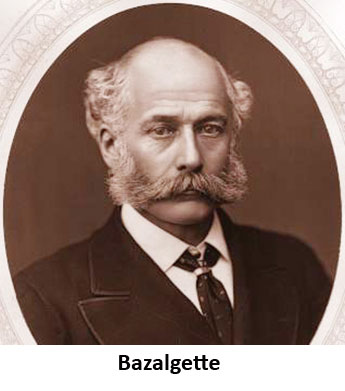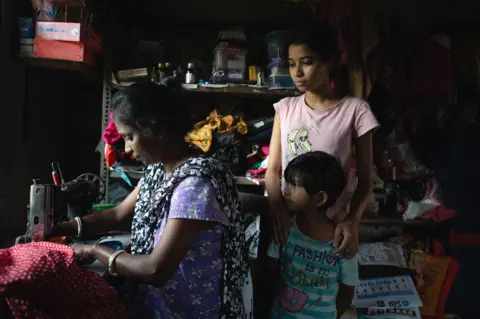Features
The Sick Man of Europe

By Michael Patrick O’Leary
According to The Economist, “Britain has endured a grim decade during which perhaps a quarter of a million people died younger than expected.”
Declining Life Expectancy
Between 1980 and 2011 life expectancy in the UK rose at a steady pace of nearly three months every year. After 2011, the rise slowed. If Britain’s life-expectancy gains continued as the long-term trend, then life expectancy in 2022 would have been 2.2 years longer than it actually was. Those 26 months represent around 700,000 additional people that have died sooner than might have been expected in the early 2010s.
Academics from the University of Oxford and the London School of Hygiene and Tropical Medicine examined global life expectancy ratings between 1952 and 2021. In a league table of life expectancy, 70 years ago, the UK ranked seventh in the world, following closely behind Norway, Sweden, and Denmark. Now, the UK performs worse than all G7 countries except the US.
The UK dropped from seventh place to 29th in global life-expectancy rankings. Life expectancy for males in the UK between 2018 and 2020 was 79, for females 82.9. Norway’s life expectancy is 80.9 years for men and 84.4 years for women. The number in Sweden was 83.18 years, marking a 0.18 per cent increase from 2021. Seventy years ago, Britons had longer life expectancy than anywhere in the G7. Now people in France, Germany, Italy, Canada and Japan live longer than Britons. Ireland also has higher life expectancy than the UK. Japan has the highest life expectancy at birth – 85 years. (Although , Monaco is at the top of the UN’s league table with 87 median).
The Economist
says, “something has gone badly wrong in the past decade, and large numbers of Britons have lived shorter lives as a result. That raises two big questions. How much of this is specific to Britain? And why?” This is not just because places such as South Korea, Taiwan, Hong Kong and Macau have got richer. The pandemic cannot be blamed for a quarter of a million early deaths since 2011. Britain had already slipped in the ranking before Covid-19 hit and has since returned to its pre-pandemic trajectory. More middle-aged and younger people are dying than otherwise would have. Girls born in 2020 are now expected to die 4.8 years earlier than was expected in 2012, and boys, 4.5 years earlier.
Variations
Analysis by the Health Foundation shows that, compared to life expectancy overall in OECD countries in 2018, only Mexico is lower than the UK. Women in the poorest 10% of areas in England can expect to live on average 78.7 years – significantly below the average of 83.2 years for the whole of England and less than the overall life expectancy for women in countries including Colombia (79.8 years), Latvia (79.7 years) and Hungary (79.6 years).
The shocking thing is that the decline in life expectancy is not evenly spread over the UK. As The Economist put it: “the uncomfortable truth is that the 250,000 do not die in places like the London borough of Westminster (where life expectancy surpasses that in the Swiss canton of Geneva). They die in poorer towns and cities.” Glasgow has the lowest life expectancy in the UK. According to the National Records of Scotland, life expectancy in Glasgow was 78.3 years for females and 73.1 years for males. At the national level, Scotland’s life expectancy was the lowest among UK countries at 76.8 years for males and 81.0 for females.
Life expectancy is 18 years higher for men in the richest part of Kensington (92) than it is in New Cross Gate (74), a poor part of London only six miles to the east. Even within the Borough of Kensington and Chelsea itself there are wide variations in socio-economic circumstances. An area best known for royal and Russian oligarch and Saudi residents (or non-resident owners ) also has pockets, particularly in the north end of the borough, of severe deprivation. The lowest life expectancy in Greater London for both men (77.0 years) and women (81.7 years) is found in Barking and Dagenham.
Healthy life expectancy means the average number of years that a person can expect to live in “full health” by taking into account years lived in less than full health due to disease and/or injury. The Healthy Life Years indicator, also known as disability-free life expectancy or Sullivan’s Index, is a European structural indicator computed by Eurostat. Healthy life expectancy for men in Tower Hamlets is 65.3 years whereas for women it is only 57.8 years.
Poverty
Severe socio-economic deprivation tends to lead to poor health. Poverty is damaging to health in many ways — through mental illness, a lack of education about nutrition and healthy ways of living and inadequate housing. Awaab Ishak was a two-year-old who died because of the fungal mould in the flat in which his family lived.
I spent a year in the UK, after becoming an exile 25 years ago. One can see every day on the streets how unhealthy so many people are. So many people look shabby, downtrodden and depressed. The most striking thing is how many grossly obese people are walking (with difficulty) the streets. Some of them are in wheelchairs. One sees a lot of wheelchairs. Obesity is one league table on which Britain ranks highly, beating all other Europeans except the Maltesers. Obesity used to be a sign of affluence, now it is a disease of poverty. Around one in every four adults and around one in every five children aged 10 in the UK are overweight. The prevalence of reception-aged children living with obesity in 2021-22 was highest in the North East (11.4%) and the West Midlands (11.3%). It was lowest in the South East (8.7%), South West (8.9%) and East of England (9.2%).

Politics of Poor Health
From the 1940s to 2010 the state pension age was 60 for women and 65 for men. Since then, the pension age for women has been equalized with men’s, and both raised to 66. Two further increases are due to follow: to 67 by 2027, and to 68 in 2046. The government was hoping it could bring that second date forward in order to improve its fiscal position. Raising the pension
age has caused riots on the streets of France. Tory MPs have urged a delay, arguing that ordinary voters would resent having to work longer at a time when the government has just relaxed tax rules on pensions for the wealthy.
One senior Tory MP warned of the “critical juxtaposition” of scrapping the £1mn lifetime allowance for pension savings while asking ordinary voters to work until 68 for a not very generous state pension. Prime Minister Rishi Sunak has released his tax returns. They show that he has made large sums outside politics and only paid tax at a rate of 22%.
Many people, including myself, have written about the downsides of economic growth. Whatever about all that, those who are supposed to be running the UK are pinning all their hopes on economic growth without having any clear plan about how to achieve it. Liz Truss was toppled by her madcap schemes to boost growth. All she did was give more money to the already rich. Hunt and Sunak seem more sensible but in reality are just mouthing optimistic platitudes.
The British malaise goes back a long way and Johnson, Truss, Kwarteng, Sunak and Hunt have done nothing but kick problems into the long grass hoping that they will solve themselves. In The Atlantic, Derek Thompson pithily summarizes the UK today: “Britain is pretty poor for a rich place. UK living standards and wages have fallen significantly behind those of Western Europe. By some measures, in fact, real wages in the UK are lower than they were 15 years ago and will likely be even lower next year.”
Thompson continues: “In the past 30 years, the British economy chose finance over industry, Britain’s government chose austerity over investment, and British voters chose a closed and poorer economy over an open and richer one. The predictable results are falling wages and stunningly low productivity growth.” Another pithy summary from Thompson: “The UK is now an object lesson for other countries dealing with a dark triad of de-industrialization, de-growth, and denigration of foreigners.”
Austerity was the Cameron (remember him coming to Sri Lanka telling us how to run our country?) government’s response to the 2008 global financial crisis. That meant cutting public services even further which means there is less support for poor people to care for elderly and sick people. Brexit was supposed to bring an extra £350 million to the NHS every week. That was a lie. Brexit brought staff shortages to the NHS as foreign workers were made unwelcome. There are food shortages today because there are no foreign seasonal workers to pick the crops and no foreign HGV drivers to deliver to the supermarkets. Imports and exports of food are stymied by hellish bureaucracy.
NHS
The days have probably gone when the NHS was revered. A study of 37.5 million patients in 2018 suffering four different sorts of cancer showed that British cancer survival rates were worse, not just than EU neighbours, but worse even than China’s. China’s breast cancer survival rate is about the same as Britain’s, its prostate cancer survival rate is worse and its lung and stomach cancer survival rates are better. China is a country in which only half of doctors have university degrees.
Municipal Heroes
Most improvements in infant mortality and life expectancy in Britain came not as a result of experiments on animals or investment by drug companies but because of public health measures implemented by local government. Successive Conservative governments have cut public spending, starving local authorities of funds to give social support to local communities. Improvements in nutrition, hygiene, housing, sanitation, control of infectious diseases and other public health measures historically reduced mortality rates. Very old people were rare 100 years ago. Less than one in 150 people was aged 80 and over in the 1920s. By 1920, life expectancy was 56 years for males and 59 years for females. Males born in 1841 could expect to live to only 40.2 years and females to 42.3 years, mainly because of high mortality rates in infancy and childhood.
The Great Stink of London
by Stephen Halliday is a fascinating read. It recounts how civil engineer Joseph Bazalgette built London’s first sewer network (still in use today), which helped to wipe out cholera in the capital. The summer of 1858 was particularly hot and humid. For centuries, the Thames had been the city’s main thoroughfare as well as a dumping ground for human, animal and industrial waste. London’s population more than doubled between 1800 and 1850, making it by far the largest in the world. By 1858, the stench overwhelmed Parliament and the politicians decided to do something about it. Bazalgette produced a network of 82 miles of new sewers, great subterranean boulevards that in places were larger than the underground train tunnels then under construction.
In 2023, Britain’s rivers are again full of shit plus a lot of chemicals and microplastics that were unknown in Bazalgette’s time. Untreated sewage released by privatized water companies is responsible for 35% of the pollution of British rivers. Pollution by water companies is particularly high in the south and southwest of England. Excessive use of fertilizer and pesticides in agriculture is responsible for 40% of river pollution. Run-off from roads and towns which contains pollutants such as oil is responsible for 18%.
Professor Steve Ormerod, an ecologist at Cardiff University, warns of other threats. He says: “We need to understand the risks which come with emerging pollutants – pharmaceuticals, microplastics. We don’t know, at this stage how big a problem they’re going to be.” The Environment Agency says, “people in deprived and heavily populated urban areas were more likely to live within 600m of a river with poor chemical or biological quality”.
The Environmental Audit Committee’s inquiry uncovered “multiple failures in the monitoring, governance and enforcement on water quality,” carried out by England’s Environment Agency. Since 1993, the number of water quality samples taken annually by the Environment Agency and Natural Resources Wales has dropped by 57%, which the committee says is a result of budget cuts.
On Wednesday March 17, 2023, the Chancellor of the Exchequer, Jeremy Hunt, presented his budget to the House of Commons, a budget that needed to restore economic health to the UK after the disastrous budget of his predecessor Kwasi Kwarteng. Economic health is an important factor in the physical health of the people of Britain. The physical health of the population in turn affects the health of the economy. Disturbing statistics are emerging which indicate that the health of people living in the UK is declining. A relative worsening of population health has historically been an early sign of severe political and economic problems. The crisis is here for the UK, the sick man of Europe.
Features
A wage for housework? India’s sweeping experiment in paying women

In a village in the central Indian state of Madhya Pradesh, a woman receives a small but steady sum each month – not wages, for she has no formal job, but an unconditional cash transfer from the government.
Premila Bhalavi says the money covers medicines, vegetables and her son’s school fees. The sum, 1,500 rupees ($16: £12), may be small, but its effect – predictable income, a sense of control and a taste of independence – is anything but.
Her story is increasingly common. Across India, 118 million adult women in 12 states now receive unconditional cash transfers from their governments, making India the site of one of the world’s largest and least-studied social-policy experiments.
Long accustomed to subsidising grain, fuel and rural jobs, India has stumbled into something more radical: paying adult women simply because they keep households running, bear the burden of unpaid care and form an electorate too large to ignore.
Eligibility filters vary – age thresholds, income caps and exclusions for families with government employees, taxpayers or owners of cars or large plots of land.
“The unconditional cash transfers signal a significant expansion of Indian states’ welfare regimes in favour of women,” Prabha Kotiswaran, a professor of law and social justice at King’s College London, told the BBC.
The transfers range from 1,000-2,500 rupees ($12-$30) a month – meagre sums, worth roughly 5-12% of household income, but regular. With 300 million women now holding bank accounts, transfers have become administratively simple.
Women typically spend the money on household and family needs – children’s education, groceries, cooking gas, medical and emergency expenses, retiring small debts and occasional personal items like gold or small comforts.
What sets India apart from Mexico, Brazil or Indonesia – countries with large conditional cash-transfer schemes – is the absence of conditions: the money arrives whether or not a child attends school or a household falls below the poverty line.

Goa was the first state to launch an unconditional cash transfer scheme to women in 2013. The phenomenon picked up just before the pandemic in 2020, when north-eastern Assam rolled out a scheme for vulnerable women. Since then these transfers have turned into a political juggernaut.
The recent wave of unconditional cash transfers targets adult women, with some states acknowledging their unpaid domestic and care work. Tamil Nadu frames its payments as a “rights grant” while West Bengal’s scheme similarly recognises women’s unpaid contributions.
In other states, the recognition is implicit: policymakers expect women to use the transfers for household and family welfare, say experts.
This focus on women’s economic role has also shaped politics: in 2021, Tamil actor-turned-politician Kamal Haasan promised “salaries for housewives”. (His fledgling party lost.) By 2024, pledges of women-focused cash transfers helped deliver victories to political parties in Maharashtra, Jharkhand, Odisha, Haryana and Andhra Pradesh.
In the recent elections in Bihar, the political power of cash transfers was on stark display. In the weeks before polling in the country’s poorest state, the government transferred 10,000 rupees ($112; £85) to 7.5 million female bank accounts under a livelihood-generation scheme. Women voted in larger numbers than men, decisively shaping the outcome.
Critics called it blatant vote-buying, but the result was clear: women helped the Bharatiya Janata Party (BJP)-led coalition secure a landslide victory. Many believe this cash infusion was a reminder of how financial support can be used as political leverage.
Yet Bihar is only one piece of a much larger picture. Across India, unconditional cash transfers are reaching tens of millions of women on a regular basis.
Maharashtra alone promises benefits for 25 million women; Odisha’s scheme reaches 71% of its female voters.
In some policy circles, the schemes are derided as vote-buying freebies. They also put pressure on state finances: 12 states are set to spend around $18bn on such payouts this fiscal year. A report by think-tank PRS Legislative Research notes that half of these states face revenue deficits – this happens when a state borrows to pay regular expenses without creating assets.
But many argue they also reflect a slow recognition of something India’s feminists have argued for decades: the economic value of unpaid domestic and care work.
Women in India spent nearly five hours a day on such work in 2024 – more than three times the time spent by men, according to the latest Time Use Survey. This lopsided burden helps explain India’s stubbornly low female labour-force participation. The cash transfers, at least, acknowledge the imbalance, experts say.
Do they work?
Evidence is still thin but instructive. A 2025 study in Maharashtra found that 30% of eligible women did not register – sometimes because of documentation problems, sometimes out of a sense of self-sufficiency. But among those who did, nearly all controlled their own bank accounts.

A 2023 survey in West Bengal found that 90% operated their accounts themselves and 86% decided how to spend the money. Most used it for food, education and medical costs; hardly transformative, but the regularity offered security and a sense of agency.
More detailed work by Prof Kotiswaran and colleagues shows mixed outcomes.
In Assam, most women spent the money on essentials; many appreciated the dignity it afforded, but few linked it to recognition of unpaid work, and most would still prefer paid jobs.
In Tamil Nadu, women getting the money spoke of peace of mind, reduced marital conflict and newfound confidence – a rare social dividend. In Karnataka, beneficiaries reported eating better, gaining more say in household decisions and wanting higher payments.
Yet only a sliver understood the scheme as compensation for unpaid care work; messaging had not travelled. Even so, women said the money allowed them to question politicians and manage emergencies. Across studies, the majority of women had full control of the cash.
“The evidence shows that the cash transfers are tremendously useful for women to meet their own immediate needs and those of their households. They also restore dignity to women who are otherwise financially dependent on their husbands for every minor expense,” Prof Kotiswaran says.
Importantly, none of the surveys finds evidence that the money discourages women from seeking paid work or entrench gender roles – the two big feminist fears, according to a report by Prof Kotiswaran along with Gale Andrew and Madhusree Jana.
Nor have they reduced women’s unpaid workload, the researchers find. They do, however, strengthen financial autonomy and modestly strengthen bargaining power. They are neither panacea nor poison: they are useful but limited tools, operating in a patriarchal society where cash alone cannot undo structural inequities.

What next?
The emerging research offers clear hints.
Eligibility rules should be simplified, especially for women doing heavy unpaid care work. Transfers should remain unconditional and independent of marital status.
But messaging should emphasise women’s rights and the value of unpaid work, and financial-literacy efforts must deepen, researchers say. And cash transfers cannot substitute for employment opportunities; many women say what they really want is work that pays and respect that endures.
“If the transfers are coupled with messaging on the recognition of women’s unpaid work, they could potentially disrupt the gendered division of labour when paid employment opportunities become available,” says Prof Kotiswaran.
India’s quiet cash transfers revolution is still in its early chapters. But it already shows that small, regular sums – paid directly to women – can shift power in subtle, significant ways.
Whether this becomes a path to empowerment or merely a new form of political patronage will depend on what India chooses to build around the money.
[BBC]
Features
People set example for politicians to follow

Some opposition political parties have striven hard to turn the disaster of Cyclone Ditwah to their advantage. A calamity of such unanticipated proportions ought to have enabled all political parties to come together to deal with this tragedy. Failure to do so would indicate both political and moral bankruptcy. The main issue they have forcefully brought up is the government’s failure to take early action on the Meteorological Department’s warnings. The Opposition even convened a meeting of their own with former President Ranil Wickremesinghe and other senior politicians who shared their experience of dealing with natural and man-made disasters of the past, and the present government’s failures to match them.
The difficulty to anticipate the havoc caused by the cyclone was compounded by the neglect of the disaster management system, which includes previous governments that failed to utilise the allocated funds in an open, transparent and corruption free manner. Land designated as “Red Zones” by the National Building Research Organisation (NBRO), a government research and development institute, were built upon by people and ignored by successive governments, civil society and the media alike. NBRO was established in 1984. According to NBRO records, the decision to launch a formal “Landslide Hazard Zonation Mapping Project (LHMP)” dates from 1986. The institutional process of identifying landslide-prone slopes, classifying zones (including what we today call “Red Zones”), and producing hazard maps, started roughly 35 to 40 years ago.
Indonesia, Thailand and the Philippines which were lashed by cyclones at around the same time as Sri Lanka experienced Cyclone Ditwah were also unprepared and also suffered enormously. The devastation caused by cyclones in the larger southeast Asian region is due to global climate change. During Cyclone Ditwah some parts of the central highlands received more than 500 mm of rainfall. Official climatological data cite the average annual rainfall for Sri Lanka as roughly 1850 mm though this varies widely by region: from around 900 mm in the dry zones up to 5,000 mm in wet zones. The torrential rains triggered by Ditwah were so heavy that for some communities they represented a rainfall surge comparable to a major part of their typical annual rainfall.
Inclusive Approach
Climate change now joins the pantheon of Sri Lanka’s challenges that are beyond the ability of a single political party or government to resolve. It is like the economic bankruptcy, ethnic conflict and corruption in governance that requires an inclusive approach in which the Opposition, civil society, religious society and the business community need to join rather than merely criticise the government. It will be in their self-interest to do so. A younger generation (Gen Z), with more energy and familiarity with digital technologies filled, the gaps that the government was unable to fill and, in a sense, made both the Opposition and traditional civil society redundant.
Within hours of news coming in that floods and landslides were causing havoc to hundreds of thousands of people, a people’s movement for relief measures was underway. There was no one organiser or leader. There were hundreds who catalysed volunteers to mobilise to collect resources and to cook meals for the victims in community kitchens they set up. These community kitchens sprang up in schools, temples, mosques, garages and even roadside stalls. Volunteers used social media to crowdsource supplies, match donors with delivery vehicles, and coordinate routes that had become impassable due to fallen trees or mudslides. It was a level of commitment and coordination rarely achieved by formal institutions.
The spontaneous outpouring of support was not only a youth phenomenon. The larger population, too, contributed to the relief effort. The Galle District Secretariat sent 23 tons of rice to the cyclone affected areas from donations brought by the people. The Matara District Secretariat made arrangements to send teams of volunteers to the worst affected areas. Just as in the Aragalaya protest movement of 2022, those who joined the relief effort were from all ethnic and religious communities. They gave their assistance to anyone in need, regardless of community. This showed that in times of crisis, Sri Lankans treat others without discrimination as human beings, not as members of specific communities.
Turning Point
The challenge to the government will be to ensure that the unity among the people that the cyclone disaster has brought will outlive the immediate relief phase and continue into the longer term task of national reconstruction. There will be a need to rethink the course of economic development to ensure human security. President Anura Kumara Dissanayake has spoken about the need to resettle all people who live above 5000 feet and to reforest those areas. This will require finding land for resettlement elsewhere. The resettlement of people in the hill country will require that the government address the issue of land rights for the Malaiyaha Tamils.
Since independence the Malaiyaha Tamils have been collectively denied ownership to land due first to citizenship issues and now due to poverty and unwillingness of plantation managements to deal with these issues in a just and humanitarian manner beneficial to the workers. Their resettlement raises complex social, economic and political questions. It demands careful planning to avoid repeating past mistakes where displaced communities were moved to areas lacking water, infrastructure or livelihoods. It also requires political consensus, as land is one of the most contentious issues in Sri Lanka, tied closely to identity, ethnicity and historical grievances. Any sustainable solution must go beyond temporary relocation and confront the historical exclusion of the Malaiyaha Tamil community, whose labour sustains the plantation economy but who remain among the poorest groups in the country.
Cyclone Ditwah has thus become a turning point. It has highlighted the need to strengthen governance and disaster preparedness, but it has also revealed a different possibility for Sri Lanka, one in which the people lead with humanity and aspire for the wellbeing of all, and the political leadership emulates their example. The people have shown through their collective response to Cyclone Ditwah that unity and compassion remain strong, which a sincere, moral and hardworking government can tap into. The challenge to the government will be to ensure that the unity among the people that the cyclone disaster has brought will outlive the immediate relief phase and continue into the longer term task of national reconstruction with political reconciliation.
by Jehan Perera
Features
An awakening: Revisiting education policy after Cyclone Ditwah

 In the short span of two or three days, Cyclone Ditwah, has caused a disaster of unprecedented proportions in our midst. Lashing away at almost the entirety of the country, it has broken through the ramparts of centuries old structures and eroded into areas, once considered safe and secure.
In the short span of two or three days, Cyclone Ditwah, has caused a disaster of unprecedented proportions in our midst. Lashing away at almost the entirety of the country, it has broken through the ramparts of centuries old structures and eroded into areas, once considered safe and secure.
The rains may have passed us by. The waters will recede, shops will reopen, water will be in our taps, and we can resume the daily grind of life. But it will not be the same anymore; it should not be. It should not be business as usual for any of us, nor for the government. Within the past few years, Sri Lankan communities have found themselves in the middle of a crisis after crisis, both natural and man-made, but always made acute by the myopic policies of successive governments, and fuelled by the deeply hierarchical, gendered and ethnicised divides that exist within our societies. The need of the hour for the government today is to reassess its policies and rethink the directions the country, as a whole, has been pushed into.
Neoliberal disaster
In the aftermath of the devastation caused by the natural disaster, fundamental questions have been raised about our existence. Our disaster is, in whole or in part, the result of a badly and cruelly managed environment of the planet. Questions have been raised about the nature of our economy. We need to rethink the way land is used. Livelihoods may have to be built anew, promoting people’s welfare, and by deveoloping a policy on climate change. Mega construction projects is a major culprit as commentators have noted. Landslides in the upcountry are not merely a result of Ditwah lashing at our shores and hills, but are far more structural and points to centuries of mismanagement of land. (https://island.lk/weather-disasters-sri-lanka-flooded-by-policy-blunders-weak-enforcement-and-environmental-crime-climate-expert/). It is also about the way people have been shunted into lands, voluntarily or involuntarily, that are precarious, in their pursuit of a viable livelihood, within the limited opportunities available to them.
Neo liberal policies that demand unfettered land appropriation and built on the premise of economic growth at any expense, leading to growing rural-urban divides, need to be scrutinised for their short and long term consequences. And it is not that any of these economic drives have brought any measure of relief and rejuvenation of the economy. We have been under the tyrannical hold of the IMF, camouflaged as aid and recovery, but sinking us deeper into the debt trap. In October 2025, Ahilan Kadirgamar writes, that the IMF programme by the end of 2027, “will set up Sri Lanka for the next crisis.” He also lambasts the Central Bank and the government’s fiscal policy for their punishing interest rates in the context of disinflation and rising poverty levels. We have had to devalue the rupee last month, and continue to rely on the workforce of domestic workers in West Asia as the major source of foreign exchange. The government’s negotiations with the IMF have focused largely on relief and infrastructure rebuilding, despite calls from civil society, demanding debt justice.
The government has unabashedly repledged its support for the big business class. The cruelest cut of them all is the appointment of a set of high level corporate personalities to the post-disaster recovery committee, with the grand name, “Rebuilding Sri Lanka.” The message is loud and clear, and is clearly a slap in the face of the working people of the country, whose needs run counter to the excessive greed of extractive corporate freeloaders. Economic growth has to be understood in terms that are radically different from what we have been forced to think of it as, till now. For instance, instead of investment for high profits, and the business of buy and sell in the market, rechannel investment and labour into overall welfare. Even catch phrases like sustainable development have missed their mark. We need to think of the economy more holistically and see it as the sustainability of life, livelihood and the wellbeing of the planet.
The disaster has brought on an urgency for rethinking our policies. One of the areas where this is critical is education. There are two fundamental challenges facing education: Budget allocation and priorities. In an address at a gathering of the Chamber of Commerce, on 02 December, speaking on rebuilding efforts, the Prime Minister and Minister of Education Dr. Harini Amarasuriya restated her commitment to the budget that has been passed, a budget that has a meagre 2.4% of the GDP allocated for education. This allocation for education comes in a year that educational reforms are being rolled out, when heavy expenses will likely be incurred. In the aftermath of the disaster, this has become more urgent than ever.
Reforms in Education
The Government has announced a set of amendments to educational policy and implementation, with little warning and almost no consultation with the public, found in the document, Transforming General Education in Sri Lanka 2025 published by the Ministry of Education. Though hailed as transformative by the Prime Minister (https://www.news.lk/current-affairs/in-the-prevailing-situation-it-is-necessary-to-act-strategically-while-creating-the-proper-investments-ensuring-that-actions-are-discharged-on-proper-policies-pm), the policy is no more than a regurgitation of what is already there, made worse. There are a few welcome moves, like the importance placed on vocational training. Here, I want to raise three points relating to vital areas of the curriculum that are of concern: 1) streamlining at an early age; relatedly 2) prioritising and privileging what is seen as STEM education; and 3) introducing a credit-based modular education.
1. A study of the policy document will demonstrate very clearly that streamlining begins with Junior Secondary Education via a career interest test, that encourages students to pursue a particular stream in higher studies. Further Learning Modules at both “Junior Secondary Education” and “Senior Secondary Education Phase I,” entrench this tendency. Psychometric testing, that furthers this goal, as already written about in our column (https://kuppicollective.lk/psychometrics-and-the-curriculum-for-general-education/) points to the bizarre.
2. The kernel of the curriculum of the qualifying examination of Senior Secondary Education Phase I, has five mandatory subjects, including First Language, Math, and Science. There is no mandatory social science or humanities related subject. One can choose two subjects from a set of electives that has history and geography as separate subjects, but a Humanities/Social Science subject is not in the list of mandatory subjects. .
3. A credit-based, modular education: Even in universities, at the level of an advanced study of a discipline, many of us are struggling with module-based education. The credit system promotes a fragmented learning process, where, depth is sacrificed for quick learning, evaluated numerically, in credit values.
Units of learning, assessed, piece meal, are emphasised over fundamentals and the detailing of fundamentals. Introducing a module based curriculum in secondary education can have an adverse impact on developing the capacity of a student to learn a subject in a sustained manner at deeper levels.
Education wise, and pedagogically, we need to be concerned about rigidly compartmentalising science oriented, including technological subjects, separately from Humanities and Social Studies. This cleavage is what has led to the idea of calling science related subjects, STEM, automatically devaluing humanities and social sciences. Ironically, universities, today, have attempted, in some instances, to mix both streams in their curriculums, but with little success; for the overall paradigm of education has been less about educational goals and pedagogical imperatives, than about technocratic priorities, namely, compartmentalisation, fragmentation, and piecemeal consumerism. A holistic response to development needs to rethink such priorities, categorisations and specialisations. A social and sociological approach has to be built into all our educational and development programmes.
National Disasters and Rebuilding Community
In the aftermath of the disaster, the role of education has to be rethought radically. We need a curriculum that is not trapped in the dichotomy of STEM and Humanities, and be overly streamlined and fragmented. The introduction of climate change as a discipline, or attention to environmental destruction cannot be a STEM subject, a Social Science/Humanities subject or even a blend of the two. It is about the vision of an economic-cum-educational policy that sees the environment and the economy as a function of the welfare of the people. Educational reforms must be built on those fundamentals and not on real or imagined short term goals, promoted at the economic end by neo liberal policies and the profiteering capitalist class.
As I write this, the sky brightens with its first streaks of light, after days of incessant rain and gloom, bringing hope into our hearts, and some cheer into the hearts of those hundreds of thousands of massively affected people, anxiously waiting for a change in the weather every second of their lives. The sense of hope that allows us to forge ahead is collective and social. The response by Lankan communities, to the disaster, has been tremendously heartwarming, infusing hope into what still is a situation without hope for many. This spirit of collective endeavour holds the promise for what should be the foundation for recovery. People’s demands and needs should shape the re-envisioning of policy, particularly in the vital areas of education and economy.
(Sivamohan Sumathy was formerly attached to the Department of English, University of Peradeniya)
Kuppi is a politics and pedagogy happening on the margins of the lecture hall that parodies, subverts, and simultaneously reaffirms social hierarchies.
By Sivamohan Sumathy
-
News7 days ago
Lunuwila tragedy not caused by those videoing Bell 212: SLAF
-

 News2 days ago
News2 days agoOver 35,000 drug offenders nabbed in 36 days
-

 News6 days ago
News6 days agoLevel III landslide early warning continue to be in force in the districts of Kandy, Kegalle, Kurunegala and Matale
-

 Business4 days ago
Business4 days agoLOLC Finance Factoring powers business growth
-

 News4 days ago
News4 days agoCPC delegation meets JVP for talks on disaster response
-

 News4 days ago
News4 days agoA 6th Year Accolade: The Eternal Opulence of My Fair Lady
-

 News2 days ago
News2 days agoRising water level in Malwathu Oya triggers alert in Thanthirimale
-

 Midweek Review7 days ago
Midweek Review7 days agoHouse erupts over Met Chief’s 12 Nov unheeded warning about cyclone Ditwah













